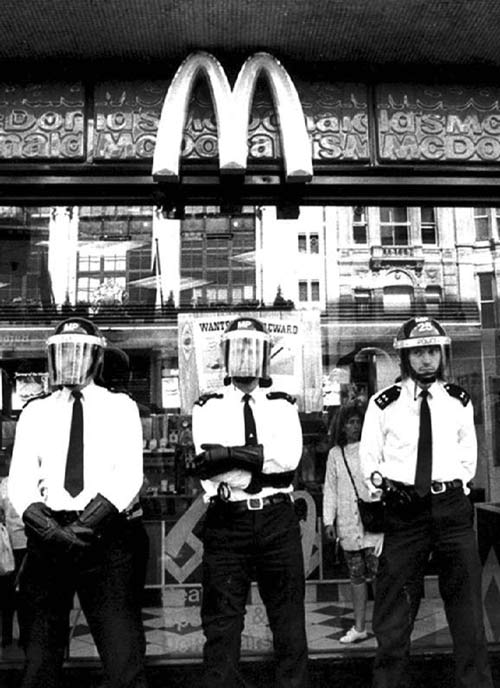
News and other Busyness
Special Branch Help McDonald’s
Squall 14, Autumn 1996, pg. 9.
According to Sid Nicholson, Vice President of McDonald’s UK, Special Branch agents freely offered information about protestors attending anti-McDonald’s demonstrations.
When asked in court who had given McDonald’s the names of those involved in the London Greenpeace anti-McDonald’s campaign, Nicholson said: “I was told them by Special Branch officers from ARNI [Animal Rights National Index]. They telephoned me to ask me if I was aware that there was going to be a demonstration outside of our offices and then they indicated that they were interested in the organisation [London Greenpeace] and did I have a perch they could use, and a perch is police parlance for an observation post. I told them I was interested and... [allowed them to] make use of any facilities they wished. ”
Although this is a highly improper collaboration, Nicholson admitted in court that “all the security department [McDonald’s] have many, many contacts in the police service” because “they are all ex-policemen”.
Indeed Nicholson himself was a member of the police force for 31 years, serving firstly in South Africa and then with the Metropolitan Police; reaching the rank of Chief Superintendent in charge of Brixton police station before leaving the force. As well as occupying the position as McDonald’s Vice President, Sid Nicholson was also executive Head of Security. His second in command as non-executive Head of Security is Terry Carrol, another ex-policeman who served under Nicholson in Brixton before becoming Chief Superintendent at Carter Street Police Station in London. Nicholson told the court the only collaboration with Special Branch he was aware of occurred in 1989 but evidence suggests the liaison has continued since.
A relatively recent memo from Terry Carrol dated September 22nd 1994 was also read out in court: “I had a meeting with ARNI from Scotland Yard today who gave me the enclosed literature. Some of it we have, other bits are new.”
Nicholson stated in court that he had “quite a lot of experience with Special Branch officers”, but that his first contact with them in relation to London Greenpeace had taken place at a meeting at McDonald’s HQ in September 1989.
One month later McDonald’s employed two separate Private Investigation Agencies to infiltrate London Greenpeace and gather intelligence. Nicholson approached both Bishops Investigation Bureau and Kings Investigative Agency but did not tell either of them that they had employed two agencies at once.
Thus each agency sent operatives to London Greenpeace meetings from October 1989 to at least January 1991, knowing nothing about each other’s activities. During this time these spies opened and replied to letters, helped distribute campaign leaflets, and made themselves familiar to London Greenpeace campaigners. One female spy, ex-policewoman Michelle Hooker from Kings Agency, also formed a relationship with one of the London Greenpeace campaigners. Nicholson also admitted in court that some of the operatives stole letters from London Greenpeace.
Whilst Kings employed between four and five investigators on the case, Bishops employed between two and three. As the attendance at London Greenpeace meetings at this time averaged less than ten, it is more than feasible that on a number of occasions half of those attending the meeting were undercover spies.
McDonald’s called four of these undercover operatives to testify on its behalf in the trial. However, one of the operatives working for Kings Investigation Bureau, Frances Tiller, decided to appear on behalf of the McLibel defendants at the end of June. In her written court statement Tiller states she “felt very uncomfortable doing that particular job.… I believe people are entitled to their views.” In her testimony she identified another undercover operative, Michelle Hooker, caught on film distributing anti-McDonald’s leaflets to the public. The two London Greenpeace co-defendants, Helen Steel and Dave Morris, have formally submitted that if agents employed by McDonald’s were involved in distributing anti-McDonald’s leaflets, then the Corporation are implicated in the very activity over which they are suing.
Meanwhile collaboration between Special Branch and multinational corporations undoubtedly continue, with seriously dire consequences for democratic voice in a world increasingly dominated by such huge commercial leviathans.
Related Articles
For the full list of Squall articles about the McLibel Trial click here
Links
McSpotlight - the McLibel campaign website - www.mcspotlight.org
